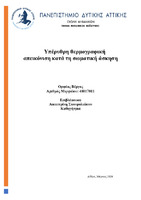| dc.contributor.advisor | Σκουρολιάκου, Αικατερίνη | |
| dc.contributor.author | Βέργος, Ορφέας | |
| dc.date.accessioned | 2024-04-23T07:50:54Z | |
| dc.date.available | 2024-04-23T07:50:54Z | |
| dc.date.issued | 2024-03-21 | |
| dc.identifier.uri | https://polynoe.lib.uniwa.gr/xmlui/handle/11400/6576 | |
| dc.identifier.uri | http://dx.doi.org/10.26265/polynoe-6412 | |
| dc.description.abstract | Το αντικείμενο της παρούσας εργασίας εστιάζεται στην μέτρηση της επιφανειακής θερμοκρασίας του σώματος με την τεχνική της υπέρυθρης θερμογραφικής απεικόνισης, πριν και μετά την αερόβια άσκηση και συγκεκριμένα την υπαίθρια ποδηλασία. Οι μετρήσεις πραγματοποιήθηκαν με την θερμοκάμερα FLIR ONE PRO, της εταιρίας FLIR. Σκοπός ήταν η παρατήρηση της θερμοκρασίας του σώματος υπό πραγματικές συνθήκες άσκησης σε εξωτερικό χώρο και όχι σε κάποιο εργαστηριακό περιβάλλον.
Τα πρώτα τρία κεφάλαια αφιερώθηκαν στην εισαγωγή και το θεωρητικό υπόβαθρο σχετικά με τους δυο βασικούς άξονες αυτής της εργασίας. Ο πρώτος άξονας αφορά την αλληλεπίδραση του ανθρώπινου οργανισμού με το περιβάλλον του και τη σωματική άσκηση, η οποία δεν αποτέλεσε μια τυχαία επιλογή, καθώς η αξία της είναι αδιαμφισβήτητη για την ποιότητα της ζωής του ανθρώπου. Τον δεύτερο βασικό άξονα αποτελεί η τεχνική της υπέρυθρης θερμογραφίας, η οποία έχει αναπτυχθεί πολύ τα τελευταία χρόνια συμμετέχοντας σε πλήθος εφαρμογών και κατακτώντας μια θέση στην μέτρηση της επιφανειακής θερμοκρασίας του σώματος στους τομείς της ιατρικής και του αθλητισμού.
Τα αποτελέσματα της πειραματικής διαδικασίας δεν έδειξαν σταθερή αντίδραση του σώματος στη διαδικασία της άσκησης, με την αύξηση ή τη μείωση της θερμοκρασίας του δέρματος, γεγονός το οποίο καταδεικνύει το μεγαλύτερο βαθμό δυσκολίας της απόπειρας εκτέλεσης της αθλητικής δοκιμασίας σε εξωτερικό περιβάλλον σε σχέση με έναν ελεγχόμενο εργαστηριακό χώρο. Επιπλέον, γεννάται η ανάγκη επανάληψης παρόμοιων πειραμάτων υπό διαφορετικές, καλύτερες συνθήκες, διαμορφωμένες βάσει των δεδομένων της εργασίας αυτής. | el |
| dc.format.extent | 105 | el |
| dc.language.iso | el | el |
| dc.publisher | Πανεπιστήμιο Δυτικής Αττικής | el |
| dc.rights | Αναφορά Δημιουργού - Μη Εμπορική Χρήση - Παρόμοια Διανομή 4.0 Διεθνές | * |
| dc.rights | Attribution-NonCommercial-NoDerivatives 4.0 Διεθνές | * |
| dc.rights.uri | http://creativecommons.org/licenses/by-nc-nd/4.0/ | * |
| dc.subject | Άσκηση | el |
| dc.subject | Ποδηλασία | el |
| dc.subject | Θερμότητα | el |
| dc.subject | Θερμοκρασία | el |
| dc.subject | ΙRT | el |
| dc.title | Υπέρυθρη θερμογραφική απεικόνιση κατά τη σωματική άσκηση | el |
| dc.title.alternative | Infrared thermographic imaging during physical exercise | el |
| dc.type | Διπλωματική εργασία | el |
| dc.contributor.committee | Kalyvas, Nektarios | |
| dc.contributor.committee | David, Stratos | |
| dc.contributor.faculty | Σχολή Μηχανικών | el |
| dc.contributor.department | Τμήμα Μηχανικών Βιοϊατρικής | el |
| dc.description.abstracttranslated | The scope of this study focuses on the measurement of body surface temperature using infrared thermographic imaging technique before and after aerobic exercise, specifically outdoor cycling. The measurements were carried out with the FLIR ONE PRO thermal camera, manufactured by FLIR. The aim was to observe the body temperature under real exercise conditions in an outdoor environment rather than in a laboratory setting.
The first three chapters were devoted to the introduction and theoretical background about the two main aspects of this work. The first axis concerns the interaction of the human body with its environment and physical exercise, which was not an accidental choice, as its value for the quality of human life is undeniable. The second main axis is the technique of infrared thermography, which has developed a lot in recent years, participating in numerous applications and gaining a place in the measurement of surface body temperature in the fields of medicine and sport.
The results of the experimental procedure did not show a stable reaction of the body to the process of exercise, with an increase or decrease in skin temperature, which demonstrates the greater degree of difficulty of attempting to perform the sports test in an outdoor environment compared to a controlled laboratory environment. In addition, it raises the need to repeat similar experiments under different, better conditions, modulated on the basis of the data of this work. | el |


